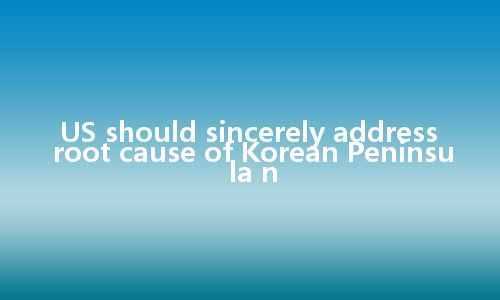The United States responded by asserting it was a clear message of defiance to recent efforts to persuade Pyongyang to end its nuclear weapons program.

Pyongyang’s missile launch at such a critical time will undoubtedly trigger higher tensions and put the security situation of itself and the Northeast Asia in danger.
The DPRK should realize the Security Council resolutions on Korean Peninsula nuclear issue aim to help ease regional tension and are in line with the common interests of all parties involved. Thus it should respect and abide by the resolutions and stop walking farther along the wrong path of taking nuclear test/missile launch as a revenge tool for sanctions.
In fact, the launch followed the usual tit-for-tat pattern of actions between the two protagonists, as it came just hours after a UN Security Council meeting chaired by US Secretary of State Rex Tillerson, in which he said all options for responding to future provocation remain on the table, including military action.
The DPRK declined to attend the meeting, with its Deputy Ambassador to the UN Kim In-ryong reiterating Pyongyang’s longstanding contention that its weapons program is the product of the US’ hostility toward the DPRK, and a change in US policy "is the precondition to solving all the problems in the Korean Peninsula".
Indeed, when it comes to the tensions on the Korean Peninsula, the US has consistently been part of the problem, rather than part of the solution.
Relations with the Democratic Republic of Korea could be normalized and the nuclear threat defused, if the US was willing to eat a little crow.
It’s unwilling to negotiate an end to the war, to which a cease-fire was agreed more than 63 years ago, because it thinks this would be a humiliating climb down and a show of weakness, and because it has, up to now at least, calculated it is not in its geostrategic interests to do so, is the fundamental obstacle to resolving the crisis.
There is callous intent behind the US repeatedly staging massive military drills with the Republic of Korea, as “the US bombed everything that moved in North Korea”, along with “every brick standing on top of another”, in the words of Dean Rusk, who was assistant secretary of state for far eastern affairs during the Korean War.
Is it really that surprising that Pyongyang wants some security guarantees?
After a visit to Pyongyang in July 2010 to secure the release of an American, Aijalon Gomes, “with the proviso that my visit would last long enough for substantive talks with top North Korean officials”, Jimmy Carter wrote in a Washington Post opinion piece, that DPRK officials spelled out in detail their desire to develop a denuclearized Korean Peninsula and a permanent cease-fire, based on the terms adopted by the six powers in September 2005, which reaffirmed the basic premises of the 1994 accord.
The text of the 1994 Agreed framework includes denuclearization of the Korean Peninsula, a pledge of non-aggression by the US and steps to evolve a permanent peace agreement to replace the cease-fire that has been in effect since July 1953.
Unfortunately, although there have been repeated overtures from Pyongyang for talks with US, suggesting that is still what Pyongyang wants, no substantive progress has been made since 2005.
That has been because up to now, at least, the tensions on the peninsula have been in the US’ interests, as they have helped to strengthen its alliances with the Republic of Korea and Japan, and given it an excuse to maintain a strong military presence in the region to put pressure on China and Russia, most recently with the deployment of the Terminal High Altitude Area Defense anti-ballistic missile system in the ROK, with its intrusively-peering radar.
As China has pointed out the root cause of the Korean nuclear problem lies in the differences between the DPRK and the US and between the DPRK and the ROK. Taking into consideration the concerns of all the parties involved and the actual situation on the Peninsula, China has proposed a “dual-track” settlement by which denuclearization on the Peninsula is swapped for an armistice and peace mechanism. This is a practical way to resolve the crisis.
If the US really does want to be part of the solution, rather than part of the problem, talking would be the best way to demonstrate it, rather than continuing to back the DPRK into the corner.